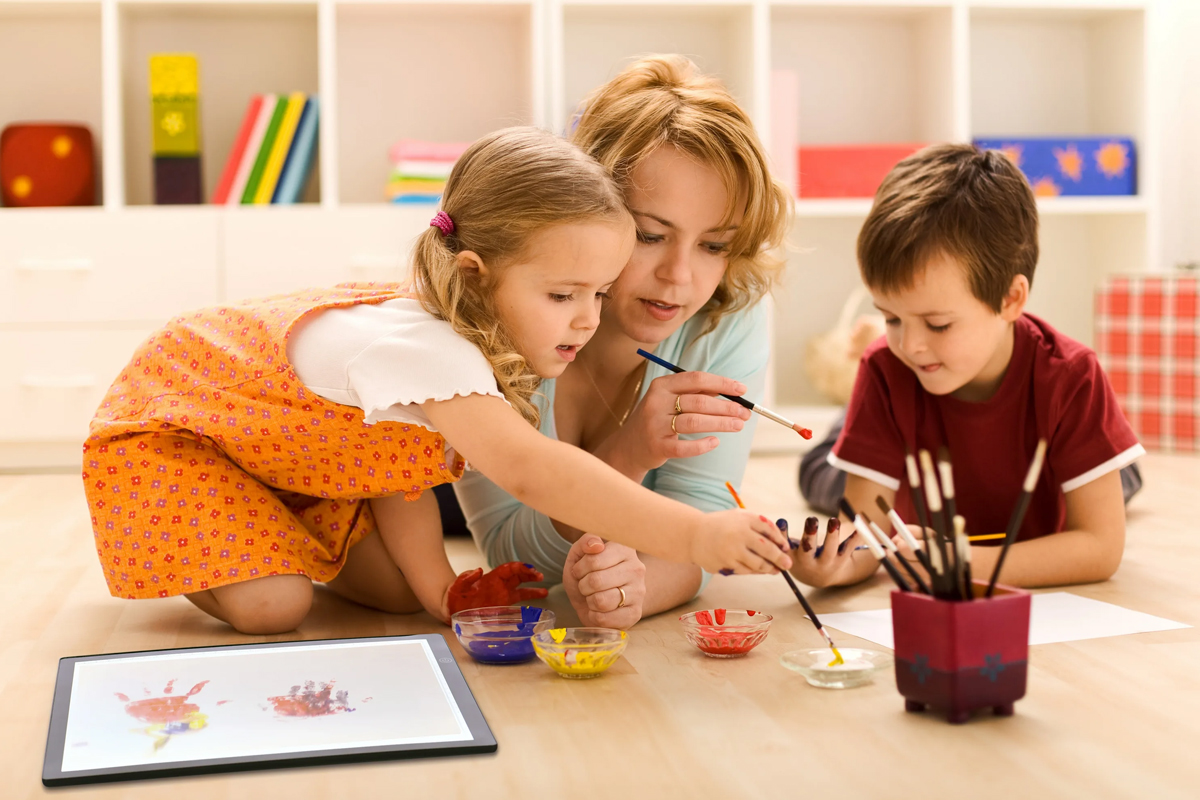Creative abilities in children are not only about drawing or writing but also about self-expression, finding unconventional solutions, and developing imagination. Educational games for children are one of the most engaging and effective ways to stimulate creativity. Let’s look at how to use games properly to reveal talents and foster a child’s imagination.
Imagination-Boosting Games: Drawing and Sculpting
Drawing and sculpting stimulate imagination and allow children to express their thoughts, emotions, and ideas by creating unique works.
Drawing
You can start with simple drawings on paper. Give the child colored pencils, crayons, or paints and suggest drawing something they’ve seen or imagined. Don’t limit the child in topics; they can draw animals, plants, or abstract shapes. Ask questions about the drawing to stimulate imagination and enhance description and association skills. Games like “drawing from spots,” where an adult draws random spots, and the child adds details to turn the spots into images, are also beneficial.
Sculpting
Clay and modeling clay are excellent materials for developing fine motor skills and imagination. Sculpting helps children understand form, size, and proportions while working with texture and volume. You can suggest creating specific objects, animals, or fictional characters. Working with clay or salt dough develops patience, as it requires precision and concentration.
Educational Games for Logic and Creative Thinking
Logical and creative thinking are closely connected. Educational games aimed at logic and creativity allow children to try different approaches to achieving goals.
Game “What If…?”
This game is a great way to encourage a child to fantasize and come up with solutions for different situations. The game is simple: an adult asks a question that begins with “What if…,” and the child responds. For example: “What if cats could talk?” or “What if we flew to the moon tomorrow?” Such questions stimulate imagination and help to come up with interesting answers, fostering non-standard thinking.
Building Blocks and Puzzles
Building requires planning, analysis, and provides freedom for creativity. Puzzles, such as jigsaw puzzles and mazes, teach children to think ahead and find ways to reach a goal. These games help develop structured thinking and motivate children to complete what they’ve started.
Role-Playing Games: Developing Social and Communication Skills
Role-playing games are essential as they allow children to try out different roles, better understand others, and develop emotional intelligence. These games give children the opportunity to immerse themselves in various situations where they learn to interact with the world.
Game “Shop” or “Café”
Suggest that the child imagine themselves as the owner of a shop or café. Let them “sell” toys or prepare “food” for parents, other children, or even toys. During the game, the child learns to interact, engage in conversation, negotiate, and show care for “customers.” This fosters communication skills and responsibility.
Theatrical Performances and Puppet Shows
Organize a small play or puppet show with the child. Let them invent a plot, choose roles, and try to perform them. This helps develop speech, teaches emotional expression, and stimulates creative thinking. Theatrical games reveal inner talents, helping the child understand and confidently express their feelings.
Tips for Parents: How to Develop a Child’s Creativity
To make games truly contribute to the development of a child’s creative abilities, it’s important to keep some recommendations in mind.
Give the Child Freedom of Choice
Do not restrict the child in creativity or insist on specific topics or plots. Let them decide what and how to do things. This builds confidence and teaches responsibility for their choices.
Praise Effort, Not the Outcome
Support the child at every stage of the game. Praise their efforts, highlight creative ideas, and ask questions about the process to make them feel the importance of their work. This helps the child understand that the process of creativity is just as important as the result.
Create a Comfortable Space for Games
Set up a suitable area for games and creativity, where the child can freely draw, sculpt, play, and imagine. Ensure they have all necessary materials at hand so they don’t feel restricted.
Educational games are a wonderful way to help a child unlock their creative potential and gain valuable skills.


